词汇学
- 格式:doc
- 大小:81.50 KB
- 文档页数:12
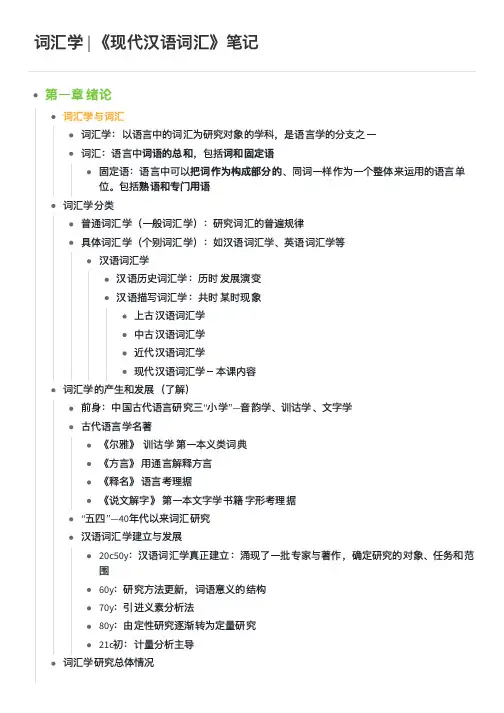
词汇学 | 《现代汉语词汇》笔记第⼀章绪论词汇学与词汇词汇学:以语⾔中的词汇为研究对象的学科,是语⾔学的分⽀之⼀词汇:语⾔中词语的总和,包括词和固定语固定语:语⾔中可以把词作为构成部分的、同词⼀样作为⼀个整体来运⽤的语⾔单位。
包括熟语和专⻔⽤语词汇学分类普通词汇学(⼀般词汇学):研究词汇的普遍规律具体词汇学(个别词汇学):如汉语词汇学、英语词汇学等汉语词汇学汉语历史词汇学:历时发展演变汉语描写词汇学:共时某时现象上古汉语词汇学中古汉语词汇学近代汉语词汇学现代汉语词汇学-本课内容词汇学的产⽣和发展(了解)前身:中国古代语⾔研究三“⼩学”—⾳韵学、训诂学、⽂字学古代语⾔学名著《尔雅》训诂学第⼀本义类词典《⽅⾔》⽤通⾔解释⽅⾔《释名》语⾔考理据《说⽂解字》第⼀本⽂字学书籍字形考理据“五四”—40年代以来词汇研究汉语词汇学建⽴与发展20c50y:汉语词汇学真正建⽴:涌现了⼀批专家与著作,确定研究的对象、任务和范围60y:研究⽅法更新,词语意义的结构70y:引进义素分析法80y:由定性研究逐渐转为定量研究21c初:计量分析主导词汇学研究总体情况词汇学研究内容:以现代汉语词汇为研究对象,研究词的性质、创造和结构、词义内容、词义发展、词的各种关系、词汇划分与关系等现代汉语词汇特点语素以单⾳节为主,词以双⾳节为主,但单⾳节词使⽤频率更⾼多⾳节词主要来源古代汉语:仿佛徘徊犹豫其他语⾔:咖啡巧克⼒沙发词语呈现双⾳化趋势为什么?内在驱动⼒:词义表达复杂化的需求与有限词形之间的⽭盾社会发展:旧词新义、⾳变构词、两个词复合构词语⾳系统简化(避免同⾳)明确表意:新产⽣的双⾳词意义明确;原有单⾳节词部分义项被取代⽽减少审美追求(双⾳节的韵律形式)句法词汇化受外来词影响结果:⻓度增加,表义明确途径单⾳节语素前或后加上辅助性相关成分:眼泪头发⽑笔松⿏⽉亮眉⽑单⾳节语素的前⾯或后⾯添加⼀个不表示具体意义的附加成分:⽼⻁阿姨桌⼦⽯头意义相同、相近或相对的单⾳节语素联合起来使⽤:国家意义寻找⽛⻮⽪肤忘记停⽌单⾳节语素重叠:哥哥妈妈爸爸仅仅静静紧紧星星单⾳节词替换成与原语素⽆关的双⾳节词:眼睛(⽬)筷⼦(箸)匣⼦(椟)⼤腿(股)三⾳节词省略其中⼀个因素照相机—相机外国语—外语电视机—电视四⾳节及其以上的词语缩略:对外贸易—外贸国有企业—国企复合词为主,内部构造与短语⼤体⼀致:并列偏正动宾动补主谓同义词数量多,同⾳语素多:适应不同需要,之间互补,具有多样性和可伸缩性词汇与⾮词汇界限模糊,切词困难语素构词理据性强,即语素义对词义有明显提示作⽤少量语素构成⼤量合成词缺少词形变化成语⼀般由四个⾳节组成⾳节相对⽽⾔较短量词、语⽓词丰富离合词多,使⽤频率⾼叠⾳词多,重叠形式较为丰富词汇学与语⾔学相关学科的关系(了解)与语⾳学:语⾳是语⾔的物质外壳,是词语的存在形式词的意义靠语⾳⼿段来表现,语⾳是词的⾳响形式。
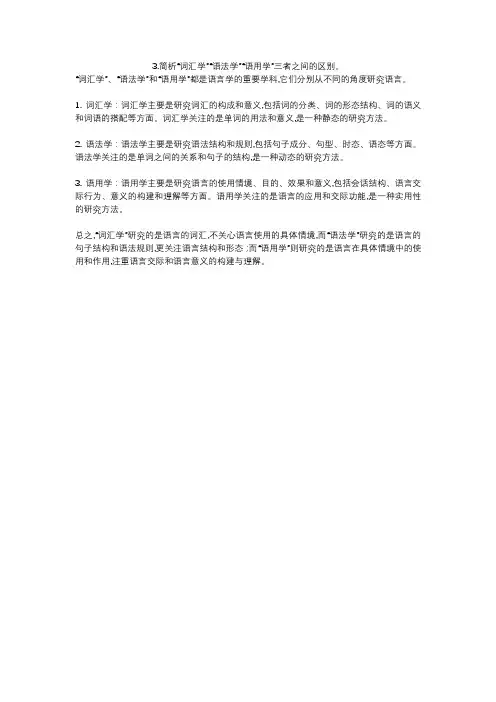
3.简析“词汇学”“语法学”“语用学”三者之间的区别。
“词汇学”、“语法学”和“语用学”都是语言学的重要学科,它们分别从不同的角度研究语言。
1. 词汇学:词汇学主要是研究词汇的构成和意义,包括词的分类、词的形态结构、词的语义和词语的搭配等方面。
词汇学关注的是单词的用法和意义,是一种静态的研究方法。
2. 语法学:语法学主要是研究语法结构和规则,包括句子成分、句型、时态、语态等方面。
语法学关注的是单词之间的关系和句子的结构,是一种动态的研究方法。
3. 语用学:语用学主要是研究语言的使用情境、目的、效果和意义,包括会话结构、语言交际行为、意义的构建和理解等方面。
语用学关注的是语言的应用和交际功能,是一种实用性的研究方法。
总之,“词汇学”研究的是语言的词汇,不关心语言使用的具体情境,而“语法学”研究的是语言的句子结构和语法规则,更关注语言结构和形态;而“语用学”则研究的是语言在具体情境中的使用和作用,注重语言交际和语言意义的构建与理解。
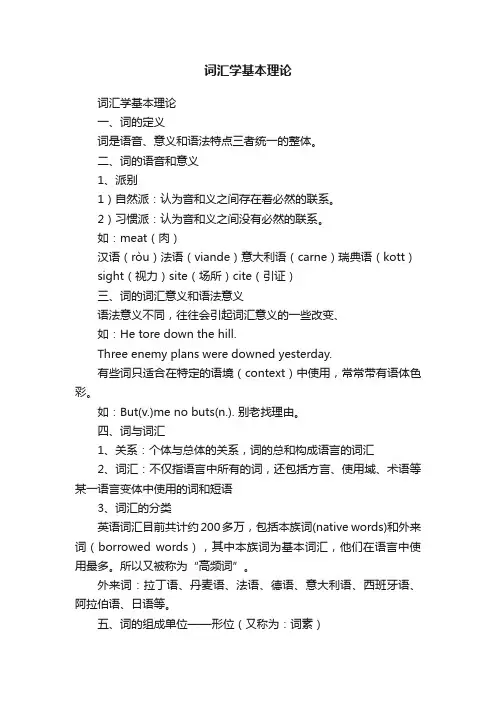
词汇学基本理论词汇学基本理论一、词的定义词是语音、意义和语法特点三者统一的整体。
二、词的语音和意义1、派别1)自然派:认为音和义之间存在着必然的联系。
2)习惯派:认为音和义之间没有必然的联系。
如:meat(肉)汉语(ròu)法语(viande)意大利语(carne)瑞典语(kott)sight(视力)site(场所)cite(引证)三、词的词汇意义和语法意义语法意义不同,往往会引起词汇意义的一些改变、如:He tore down the hill.Three enemy plans were downed yesterday.有些词只适合在特定的语境(context)中使用,常常带有语体色彩。
如:But(v.)me no buts(n.). 别老找理由。
四、词与词汇1、关系:个体与总体的关系,词的总和构成语言的词汇2、词汇:不仅指语言中所有的词,还包括方言、使用域、术语等某一语言变体中使用的词和短语3、词汇的分类英语词汇目前共计约200多万,包括本族词(native words)和外来词(borrowed words),其中本族词为基本词汇,他们在语言中使用最多。
所以又被称为“高频词”。
外来词:拉丁语、丹麦语、法语、德语、意大利语、西班牙语、阿拉伯语、日语等。
五、词的组成单位——形位(又称为:词素)1、形位的概念:是最小的语法单位,也是最小的语义单位。
2、类型:词是由形位构成的,有的词只有一个形位,如log, clerk solider等,有的词有多个形位,如lovely有love 和ly 两个形位,unfriendly有un,friend,ly 三个形位。
六、实义形位、语法形位1)实义形位:构成词的语义基础,可以单独使用,有独立的意义,所以又称为自由形位或自由词素。
这种形位相当于词根(root)如:teacher中的teach 2)语法形位:只表示附加意义或语法意义,必须依附于其他形位与之结合才能使用,所以,又被称之为“粘附形位”或“粘附词素”。
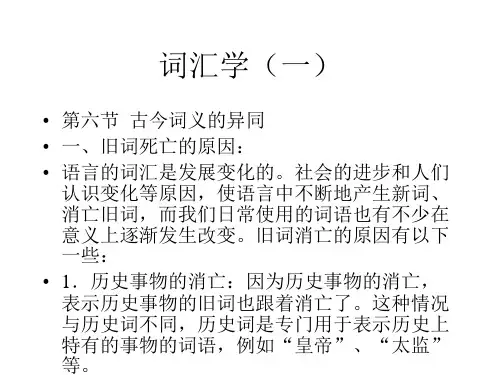
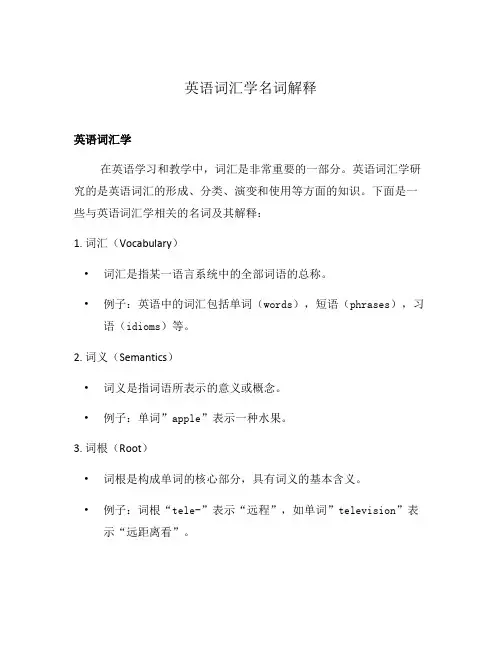
英语词汇学名词解释英语词汇学在英语学习和教学中,词汇是非常重要的一部分。
英语词汇学研究的是英语词汇的形成、分类、演变和使用等方面的知识。
下面是一些与英语词汇学相关的名词及其解释:1. 词汇(Vocabulary)•词汇是指某一语言系统中的全部词语的总称。
•例子:英语中的词汇包括单词(words),短语(phrases),习语(idioms)等。
2. 词义(Semantics)•词义是指词语所表示的意义或概念。
•例子:单词”apple”表示一种水果。
3. 词根(Root)•词根是构成单词的核心部分,具有词义的基本含义。
•例子:词根“tele-”表示“远程”,如单词”television”表示“远距离看”。
4. 词形(Morphology)•词形是指词语形态上的变化,包括词根的变化、词缀的添加和词语形式的变化等。
•例子:单词”run”经过词形变化可以有”running”(进行时态)和”ran”(过去时态)等形式。
5. 词汇量(Vocabulary Size)•词汇量是指一个人掌握或理解的词汇数量。
•例子:一般来说,英语水平高的人词汇量会相对较大。
6. 同义词(Synonym)•同义词是指语义相近的两个或多个词语。
•例子:“happy”和”glad”都是表示“高兴”的同义词。
7. 反义词(Antonym)•反义词是指意义相对立的两个词语。
•例子:“big”和”small”是表示“大”和“小”的反义词。
8. 多词性(Polysemy)•多词性是指一个词语具有多个不同但相关的词义。
•例子:单词”bank”可以表示“银行”或“河岸”。
9. 词汇补偿(Vocabulary Compensation)•词汇补偿是指在理解语言时,通过上下文和其他线索来推测未知词汇的意义。
•例子:如果不认识单词”obscure”,可以通过上下文来猜测它的意义是“不清楚的”。
这些名词和概念在英语词汇学中起着重要的作用,了解它们可以帮助我们更好地学习和使用英语词汇。
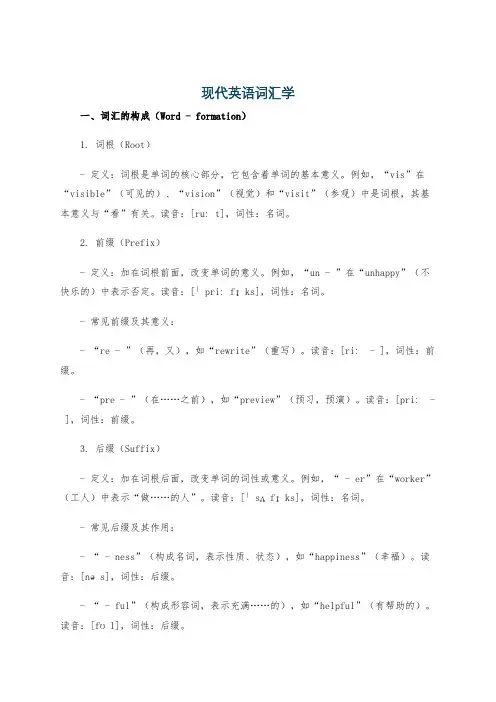
现代英语词汇学一、词汇的构成(Word - formation)1. 词根(Root)- 定义:词根是单词的核心部分,它包含着单词的基本意义。
例如,“vis”在“visible”(可见的)、“vision”(视觉)和“visit”(参观)中是词根,其基本意义与“看”有关。
读音:[ruːt],词性:名词。
2. 前缀(Prefix)- 定义:加在词根前面,改变单词的意义。
例如,“un - ”在“unhappy”(不快乐的)中表示否定。
读音:[ˈpriːfɪks],词性:名词。
- 常见前缀及其意义:- “re - ”(再,又),如“rewrite”(重写)。
读音:[riː - ],词性:前缀。
- “pre - ”(在……之前),如“preview”(预习,预演)。
读音:[priː - ],词性:前缀。
3. 后缀(Suffix)- 定义:加在词根后面,改变单词的词性或意义。
例如,“ - er”在“worker”(工人)中表示“做……的人”。
读音:[ˈsʌfɪks],词性:名词。
- 常见后缀及其作用:- “ - ness”(构成名词,表示性质、状态),如“happiness”(幸福)。
读音:[nəs],词性:后缀。
- “ - ful”(构成形容词,表示充满……的),如“helpful”(有帮助的)。
读音:[fʊl],词性:后缀。
二、词性(Parts of Speech)1. 名词(Noun)- 定义:表示人、事物、地点、抽象概念等。
例如,“book”(书)、“city”(城市)、“love”(爱)。
读音:[naʊn],词性:名词。
- 名词的分类:- 可数名词(Countable Noun),如“apple”(苹果),有单复数形式。
- 不可数名词(Uncountable Noun),如“water”(水),一般没有复数形式。
2. 动词(Verb)- 定义:表示动作或状态。
例如,“run”(跑)、“be”(是)。
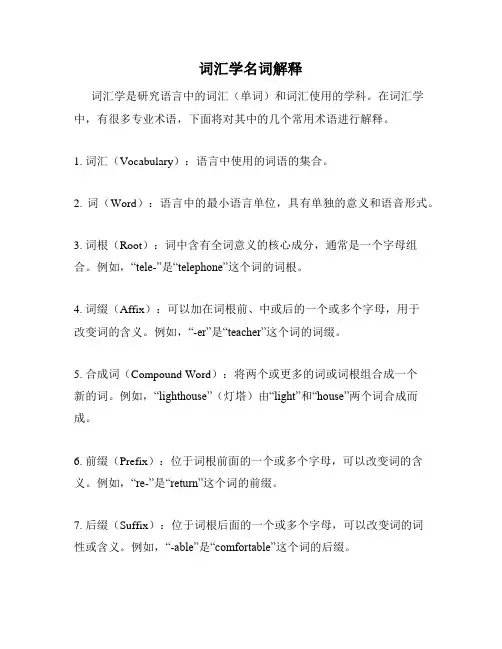
词汇学名词解释词汇学是研究语言中的词汇(单词)和词汇使用的学科。
在词汇学中,有很多专业术语,下面将对其中的几个常用术语进行解释。
1. 词汇(Vocabulary):语言中使用的词语的集合。
2. 词(Word):语言中的最小语言单位,具有单独的意义和语音形式。
3. 词根(Root):词中含有全词意义的核心成分,通常是一个字母组合。
例如,“tele-”是“telephone”这个词的词根。
4. 词缀(Affix):可以加在词根前、中或后的一个或多个字母,用于改变词的含义。
例如,“-er”是“teacher”这个词的词缀。
5. 合成词(Compound Word):将两个或更多的词或词根组合成一个新的词。
例如,“lighthouse”(灯塔)由“light”和“house”两个词合成而成。
6. 前缀(Prefix):位于词根前面的一个或多个字母,可以改变词的含义。
例如,“re-”是“return”这个词的前缀。
7. 后缀(Suffix):位于词根后面的一个或多个字母,可以改变词的词性或含义。
例如,“-able”是“comfortable”这个词的后缀。
8. 短语(Phrase):由两个或多个单词组成的词组,没有主语和谓语。
例如,“in the morning”(在早晨)是一个短语。
9. 句子(Sentence):有明确的主语和谓语,可以表达一个完整的意思。
以上是词汇学中常见的术语解释,它们有助于我们更好地理解语言中的单词和词组。
除此之外,词汇学还研究了词的来源、演变、分类和使用等方面,是一门十分重要的学科。
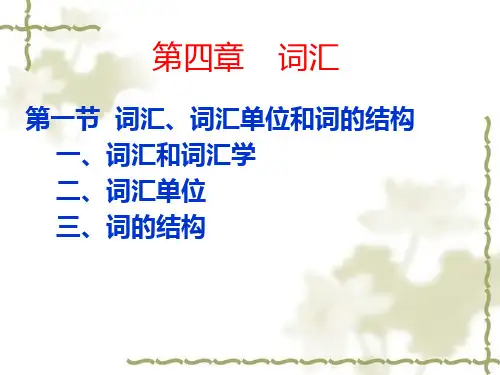
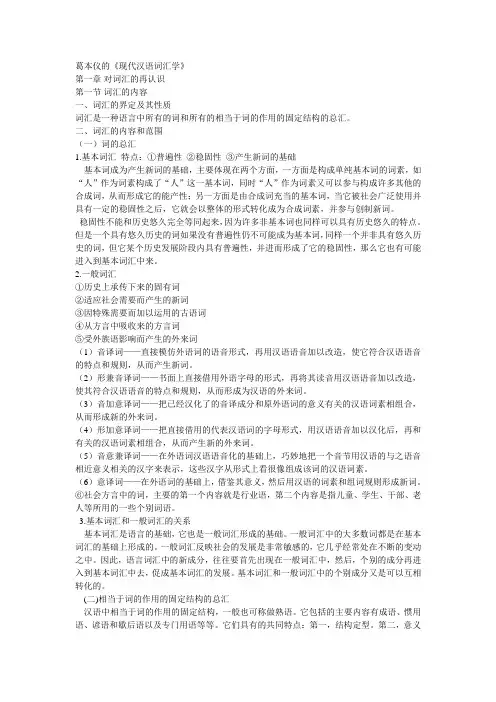
葛本仪的《现代汉语词汇学》第一章对词汇的再认识第一节词汇的内容一、词汇的界定及其性质词汇是一种语言中所有的词和所有的相当于词的作用的固定结构的总汇。
二、词汇的内容和范围(一)词的总汇1.基本词汇特点:①普遍性②稳固性③产生新词的基础基本词成为产生新词的基础,主要体现在两个方面,一方面是构成单纯基本词的词素,如“人”作为词素构成了“人”这一基本词,同时“人”作为词素又可以参与构成许多其他的合成词,从而形成它的能产性;另一方面是由合成词充当的基本词,当它被社会广泛使用并具有一定的稳固性之后,它就会以整体的形式转化成为合成词素,并参与创制新词。
稳固性不能和历史悠久完全等同起来,因为许多非基本词也同样可以具有历史悠久的特点。
但是一个具有悠久历史的词如果没有普遍性仍不可能成为基本词,同样一个并非具有悠久历史的词,但它某个历史发展阶段内具有普遍性,并进而形成了它的稳固性,那么它也有可能进入到基本词汇中来。
2.一般词汇①历史上承传下来的固有词②适应社会需要而产生的新词③因特殊需要而加以运用的古语词④从方言中吸收来的方言词⑤受外族语影响而产生的外来词(1)音译词——直接模仿外语词的语音形式,再用汉语语音加以改造,使它符合汉语语音的特点和规则,从而产生新词。
(2)形兼音译词——书面上直接借用外语字母的形式,再将其读音用汉语语音加以改造,使其符合汉语语音的特点和规则,从而形成为汉语的外来词。
(3)音加意译词——把已经汉化了的音译成分和原外语词的意义有关的汉语词素相组合,从而形成新的外来词。
(4)形加意译词——把直接借用的代表汉语词的字母形式,用汉语语音加以汉化后,再和有关的汉语词素相组合,从而产生新的外来词。
(5)音意兼译词——在外语词汉语语音化的基础上,巧妙地把一个音节用汉语的与之语音相近意义相关的汉字来表示,这些汉字从形式上看很像组成该词的汉语词素。
(6)意译词——在外语词的基础上,借鉴其意义,然后用汉语的词素和组词规则形成新词。
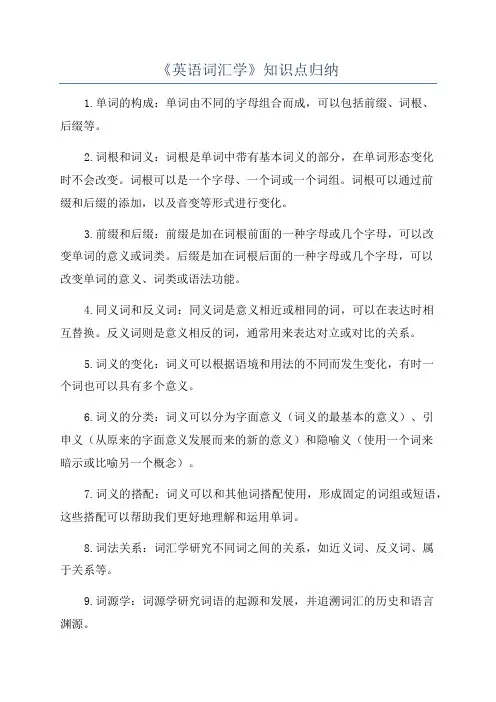
《英语词汇学》知识点归纳
1.单词的构成:单词由不同的字母组合而成,可以包括前缀、词根、
后缀等。
2.词根和词义:词根是单词中带有基本词义的部分,在单词形态变化
时不会改变。
词根可以是一个字母、一个词或一个词组。
词根可以通过前
缀和后缀的添加,以及音变等形式进行变化。
3.前缀和后缀:前缀是加在词根前面的一种字母或几个字母,可以改
变单词的意义或词类。
后缀是加在词根后面的一种字母或几个字母,可以
改变单词的意义、词类或语法功能。
4.同义词和反义词:同义词是意义相近或相同的词,可以在表达时相
互替换。
反义词则是意义相反的词,通常用来表达对立或对比的关系。
5.词义的变化:词义可以根据语境和用法的不同而发生变化,有时一
个词也可以具有多个意义。
6.词义的分类:词义可以分为字面意义(词义的最基本的意义)、引
申义(从原来的字面意义发展而来的新的意义)和隐喻义(使用一个词来
暗示或比喻另一个概念)。
7.词义的搭配:词义可以和其他词搭配使用,形成固定的词组或短语,这些搭配可以帮助我们更好地理解和运用单词。
8.词法关系:词汇学研究不同词之间的关系,如近义词、反义词、属
于关系等。
9.词源学:词源学研究词语的起源和发展,并追溯词汇的历史和语言
渊源。
10.词汇扩充:词汇学研究如何通过学习和运用词汇扩充词汇量,如学习词根、前缀和后缀的意义和用法,以及拆解和分析复杂单词的方法。
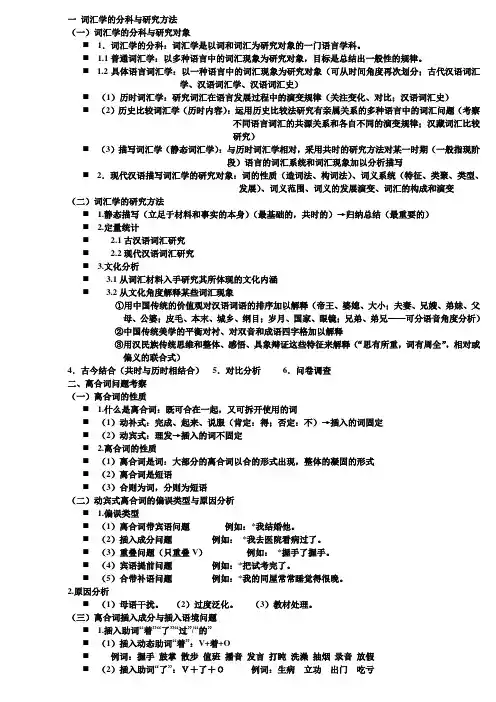
一词汇学的分科与研究方法(一)词汇学的分科与研究对象⏹1.词汇学的分科:词汇学是以词和词汇为研究对象的一门语言学科。
⏹ 1.1普通词汇学:以多种语言中的词汇现象为研究对象,目标是总结出一般性的规律。
⏹ 1.2具体语言词汇学:以一种语言中的词汇现象为研究对象(可从时间角度再次划分;古代汉语词汇学、汉语词汇学、汉语词汇史)⏹(1)历时词汇学:研究词汇在语言发展过程中的演变规律(关注变化、对比;汉语词汇史)⏹(2)历史比较词汇学(历时内容):运用历史比较法研究有亲属关系的多种语言中的词汇问题(考察不同语言词汇的共源关系和各自不同的演变规律;汉藏词汇比较研究)⏹(3)描写词汇学(静态词汇学):与历时词汇学相对,采用共时的研究方法对某一时期(一般指现阶段)语言的词汇系统和词汇现象加以分析描写⏹2.现代汉语描写词汇学的研究对象:词的性质(造词法、构词法)、词义系统(特征、类聚、类型、发展)、词义范围、词义的发展演变、词汇的构成和演变(二)词汇学的研究方法⏹ 1.静态描写(立足于材料和事实的本身)(最基础的,共时的)→归纳总结(最重要的)⏹ 2.定量统计⏹ 2.1古汉语词汇研究⏹ 2.2现代汉语词汇研究⏹ 3.文化分析⏹ 3.1从词汇材料入手研究其所体现的文化内涵⏹ 3.2从文化角度解释某些词汇现象①用中国传统的价值观对汉语词语的排序加以解释(帝王、婆媳、大小;夫妻、兄嫂、弟妹、父母、公婆;皮毛、本末、城乡、纲目;岁月、国家、眼镜;兄弟、弟兄——可分语音角度分析)②中国传统美学的平衡对衬、对双音和成语四字格加以解释③用汉民族传统思维和整体、感悟、具象辩证这些特征来解释(“思有所重,词有周全”,相对或偏义的联合式)4.古今结合(共时与历时相结合)5.对比分析6.问卷调查二、离合词问题考察(一)离合词的性质⏹ 1.什么是离合词:既可合在一起,又可拆开使用的词⏹(1)动补式:完成、起来、说服(肯定:得;否定:不)→插入的词固定⏹(2)动宾式:理发→插入的词不固定⏹ 2.离合词的性质⏹(1)离合词是词:大部分的离合词以合的形式出现,整体的凝固的形式⏹(2)离合词是短语⏹(3)合则为词,分则为短语(二)动宾式离合词的偏误类型与原因分析⏹ 1.偏误类型⏹(1)离合词带宾语问题例如:*我结婚他。
英语词汇学名词解释英语词汇学(Lexicology)是研究词汇的科学学科。
它涵盖了词汇的各个方面,包括词汇的产生、发展和变化等。
首先,词汇学研究词汇的产生。
词汇是人类语言的基本单位,是人类表达思想和交流信息的重要工具。
词汇的产生与人类的生活和社会环境密切相关。
在人类社会发展的过程中,随着新事物的出现和新概念的产生,新词汇也会随之产生。
例如,随着科技的进步,电脑、互联网、手机等新技术词汇相继产生。
其次,词汇学研究词汇的发展。
词汇的发展主要包括词汇的演变和词义的扩展。
词汇的演变是指词汇在使用过程中发生的变化。
例如,英语中的单词“nice”原本的意思是“愚蠢的”,但随着时间的推移,其词义逐渐扩展为“友好的”、“美好的”等。
词义的扩展是指词汇在使用过程中逐渐获得更广泛的意义。
例如,英语中的单词“mouse”原本指小老鼠,但在计算机领域中,它也指计算机的鼠标。
此外,词汇学还研究词汇的变化。
词汇的变化包括发音、拼写和形态等方面的变化。
发音的变化指的是词汇在不同时期和地区的发音差异。
例如,英语中的单词“knight”在古英语时期的发音是/knixt/,但在现代英语中,它的发音变为/naɪt/。
拼写的变化是指词汇在不同时期和地区的拼写方式的差异。
例如,英语中的单词“colour”在美国被拼写为“color”。
形态的变化是指词汇在不同时期和语言环境中的词形变化。
例如,英语中的单词“goose”的复数形式在古英语中为“gǣs”,而在现代英语中为“geese”。
总之,英语词汇学研究词汇的产生、发展和变化,揭示了词汇在语言中的重要地位和作用。
通过深入研究词汇,我们可以更好地理解和运用英语,提高我们的语言能力。
词汇学名词解释词汇学是语言学的分支领域之一,研究词汇的性质、结构、意义和使用规律。
以下是对词汇学中几个关键概念的解释:1. 词汇(Lexicon):词汇是一个语言中的全部词条,包括单词、短语和常用搭配等。
词汇是一种基本的语言单位,是语言交流和理解的基础。
2. 词性(Part of Speech):词性指词汇中有关词的分类。
根据词的语法和语义特征,可以将词汇分为名词、动词、形容词、副词、介词、代词、连词和感叹词等不同的词性。
3. 词义(Word Meaning):词义是一个词汇所表达的概念、事物或动作的意义。
词义可以通过定义、同义词、反义词以及词汇搭配等方式进行解释和理解。
4. 词根(Root):词根是一个词汇的基本核心部分,通常带有主要的语义意义。
通过加前缀、后缀和派生等方式,可以将词根组合成更复杂的词汇形式。
5. 同义词(Synonym):同义词是具有相同或相似词义的词汇。
同义词可以提供多种不同的方式来表达同一概念,丰富了语言的表达能力。
6. 反义词(Antonym):反义词是在词义上相互对立或相互排斥的词汇。
通过使用反义词可以传达相反的意义和观点。
7. 语义范畴(Semantic Field):语义范畴是一组具有相似语义关联的词汇。
这些词汇之间存在概念上的联系,并且可以通过它们之间的关系进行划分和归类。
8. 词汇搭配(Collocation):词汇搭配指的是在不同上下文中常常一起出现的词组合。
词汇搭配可以是习语、固定搭配或者常用的短语,对于正确地理解和使用词汇是非常重要的。
9. 词法关系(Lexical Relation):词法关系是不同词汇之间的关系,包括上下义关系、同源关系、形态关系、语法关系等。
这些关系有助于理解词汇之间的联系和共同特征。
10. 词源学(Etymology):词源学研究词汇的起源和历史发展。
通过对词汇的来源和历史变化的研究,可以了解词汇之间的发展和演变过程。
总之,词汇学的研究有助于我们更好地理解和使用词汇,掌握词汇的形式、意义和用法,从而提高语言的表达能力和沟通效果。
现代汉语词汇(第一节词汇概说)一、词汇学的分科词汇学是以词和词汇为研究对象的一门语言学科。
可分为普通词汇学与具体语言词汇学两大类。
1、普通词汇学又称一般词汇学,是普通语言学的一个组成部分。
它以多种语言中的词汇现象为研究对象,从而总结出一般性的规律。
2、具体语言词汇学又称个别语言词汇学,以一种语言中的词汇现象为研究对象。
从历时与共时角度划分,又分为历史词汇学、历史比较词汇学与描写词汇学等。
(1)历时词汇学主要研究词汇在语言发展过程中的的演变规律。
比如汉语词汇史主要研究汉语词汇在上古、中古、近古不同历史阶段中的发展情况。
而上古词汇史则研究汉语词汇在殷商、先秦、两汉时期的演变规律,一般以文献记载的材料或所发掘的相关出土文物为研究对象。
(2)历史比较词汇学主要是运用历史比较方法,研究有亲属关系的多种语言中的词汇问题。
比如汉藏词汇比较研究,则侧重于考察不同词汇词语间的共源关系以及各自不同的演变规律。
(3)描写词汇学是研究语言词汇在一定阶段,一般指现阶段的特点。
现代汉语描写词汇学的研究对象主要涉及以下几个方面的内容:词的性质,词的造词与构词,词义的类型,词义的特征,词义的类聚,词义的发展,词汇的构成与演变等。
二、语素、词、词汇(一)语素1、什么是语素定义:语素是语言中最小的音义结合体。
特点:(1)有声音:好/ 人(2)有意义:蝴蝶玻璃新加坡麦当劳(3)最小:桌子(2 个语素)巧克力(1 个语素)(4)功能是构词:好:好看/ 好吃;人:人民/ 人情2 .语素的分类按语音形式划分(1)单音语素:手灯/ 走观/ 红绿/ 男女/ 一千/ 条个/ 吗的(2)多音语素:乌鲁木齐新加坡香港(源自莞香装运地/ 源自海盗香姑的名字)按语言功能划分(1)成词语素指可以独立成词的语素,也叫自由语素。
该类语素独立成词后可在句中单独使用。
例如:“人”可在句中单独出现:人来了;也可构词:客人。
(2)非词语素不能独立成词的语素,包含半自由语素与不自由语素两种类型。
词汇学Assignments(派生法思考题):1. What are the characteristics of prefixes and suffixes?2. What is affixation? 什么是词缀法?What’s the difference between prefixation and suffixation?3. What are the characteristics of prefixes and suffixes? 前缀和后缀的特点?4. Each of the following sentences contains a word printed in italics. Complete the sentence by using this word to form a noun to refer ro a person.a. If you are employed by a company, you are one of its _____.b. A _____ is someone whose job is politics.c. The _____ in a discussion are the people who participate in it.d. A woman who works as a _____ does the same job as a waiter.e. The person who conducts an orchestraor choir is called _____ .f. Your _____ is the person who teaches you.g. A _____ is someone who earns their living by playing the piano.h. If someone examines you, you are the _____ and he or she is the _____.答案:employee, politician, participator, waitress,conductor, teacher, pianist, examinee, examinerCompounding 复合词1. 以所列单词为第一个成分,根据定义写出复合词。
A. green1. a stretch of land, round a town, where building is not allowed, so that fields, woods, etc. , remain:________2. a shop-keeper who sells vegetables and fruit:_____3. a young, inexperienced person, especially male, who is easily cheated:_________4. a room in a theatre or concert hall where actors, musicians, etc., can rest when not performing:________B. hand1. a small bag for a woman to carry her. money and personal things in:________2. a short book giving all the most important information about a subject: ________3. an apparatus that stops a vehicle, worked by the, driver's hand:____4. a bar of wood or metal fixed beside a place where one walks for, holding onto, especially near stairs; ________C. after1. the care or treatment to someone after a period in hospital, prison, etc. :______2. an effect (usually unpleasant) that follows some time after the cause or after the main effect:______3. a taste that stays in the mouth after the food that caused it is no longer there:_______4. an idea that comes later:_____D. sleeping1. a large thick envelope or bag of warm material for sleeping in when camping:_____2. a railway carriage with beds for passengers:_____3. a pill which helps a person to sleep:_____4. a partner in a business who takes no active part in its opera-tion: _______1E; running1. a person with whom another is running for a pair of political positions of greater or less importance, especially those of President and Vice-President:_____2. handwriting in which the letters are slanted and the words formed without lifting the pen:______.3. a headline repeated on consecutive pages (as of a book): _______4. a footboard especially at the side of an automobile:_______F. wash1. a large fixed basin for water for washing one's hands and face:_______2. a movable board with a wavy surface against which clothes may be rubbed when washing:______ |3. a woman whose job is to wash clothes, often in her own home:_______4. a cloth that is used for washing one's face and body:_____G. sun1. the condition of having sore. skin after experiencing the effects of strong sunlight:______2. a flash of sunlight, especially through a break in clouds: _____3. the time when the sun is seen to disappear as night begins: _____4. strong sunlight, as when there are no clouds:_____H. break1. a sudden failure in operation:_____2. the unlawful cantering of a building, using force:______3. the action of forcing a way through the enemy:______4. a division into smaller parts:_____I. out1. a sudden appearance or beginning of something bad:______2. a public show of anger:_____3. money spent for a purpose:______4. a way through which something (usually a liquid or a gas) may go out: _____答案A. greenbelt greengrocer greenhorn greenroomB. handbag handbook handbrake handrailC. aftercare aftereffect aftertaste afterthoughtD. sleeping bag sleeping car sleeping pill sleeping partnerE. running mate running hand running head running boardF. washbasin washboard washerwoma washclothG. sunburn sunburst sunset sunshineH. breakdown break-in breakthrough breakupI. outbreak outcry outlay outletConversion 转化找出下列句子中由名词转化的动词1. A shy, frightened child stood before a government inspector in a Polish schoolroom. "Name the Czar of Russia," he barked; the girl did so in a voice which she tried to keep steady. ( )2. At once the villagers formed a circle and started moving around me, singing to the accompaniment of a kol-a. ( )3. Agamemnon with the rest of the Greek army sailed away in their ships at night. ( )4. Almost before the Trojans could arm themselves and long before they could make any plans for2defense, the city was lost, high buildings were falling and flames were shooting high into the sky. ( )5. I began to see the light: of course, the snatchers—-always young men, even boys—would expecta large purse stuffed with money and all kinds of valuables. ( )6. A few years ago the landlady locked the front door and installed a bell and buzzer system, which made burglary more difficult though not impossible. ( )7. An upstairs tenant, who happened to be looking out of his window, came running down, questioned the men and demanded their identification. ( )8. The children headed toward school, carrying slates and followed by their dogs. ( )9. Like the trunk of a tree, it rose in the air, branching out as it climbed. ( )10. An hour went by and darkness still shrouded everything. ( )11. They boarded boats and got away, living to tell the tale of their city's destruction. ( )12. The day-to-day effect of dirty air is hard to measure,and most people take it for granted. ( )13. When these gases mix with fog, smog results. ( )14. There are a few success stories in battling air pollution. ( )15. Pollution can be trapped before they pour out of chimneys —and a pollution-free car can be built. ( )16. If nations traded item for item, such as one automobile for . 10,000 bags of coffee, foreign trade would be extremely cumbersome and restrictive. ( )17. She's the one who's sapped your confidence. ( )18. .His place on the seat was taken almost immediately by a young man, fairly well dressed but scarcely more cheerful than the other. ( )19. The young man quickly removed any doubt by pocketing the money. ( )20. But the preparation on which he laid the colours was defective, and they started to flake off even in Leonardo's own lifetime. ( )答案: 1. name 2. form 3. sail4. Arm5. stuff6. lock7. question 8. head 9. branch10. shroud 11. board 12. measure13. result 14. battle 15. trap16. trade 17. sap 18. drpss-^19. pocket 20. flake找出下列句子中由形容词转化的动词1. Calming down, I convinced myself this was something that had to happen once in a lifetime. ( )2. Such was Pompeii on its last day. And so it is to-day, now that the volcanic ash has been cleared away. ( )3. Houses and clothes must be cleaned more frequently. ( )4. In the nineteenth and twentieth centuries, the chemical industry turned out many new products which, says Lucy Kavaler in her book Dangerous Air, "helped raise the standard of living and lower the standard of air.”( )5. Bom in 1879, in LJln, Germany, Einstein was two years old when his parents moved to Munich. There his father opened'a business in electrical supplies. ( )6. The Academy of Science was closed to him; his house was searched for weapons; he lost his professorship; all his property was seized; and finally his German citizenship was taken away. ( )37. When the oil is heated, the first vapours to rise are cooled and become the finest petrol. ( )8. He emptied out all his pockets onto the table. ( )9. Part of the old wall fell on the workman, and it took half an hour to free him. ( )10. The wet clothes will soon dry in the sun. ( )答案:1. calm2. clear3. clean4. lower5. open6. close7. cool 8. empty 9. free10. dry找出下列句子中由动词转化的名词1. Why is this enormous increase in population taking place? It is really due to the spread of the knowledge and the practice of what is coming to be called Death Control. ( )2. In the nineteenth century one great discovery came to the aid of the surgeon when James Young Simpson experimented with anaesthetics. ( )3. I know my friends from the feel of their faces. ( )4. But I cannot really picture their personalities by touch. ( )5. "Nobody's saying anything," said James, between serves. ( )6. Grandpa gave her one of his slow grins. ( )7. And Fabin gave him an appealing look. ( )8. I will try to explain to you what has given rise to these slanders and given me a bad name. ( )9. Rex could hold a baseball with ease in his mouth in one cheek, as if it were a chew of tobacco. ( )10. They insisted that we get rid of Rex, but we were very happy with him, and nobody could have made us give him up. ( )答案:1. increase, spread4. touch7. look10. rid2. aid3. feel5. serve6. grin8. rise 9. chew5. 将下列各组词按褒义- 中性–贬义的顺序排列。